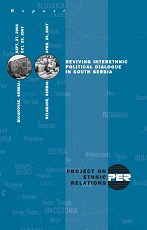Reviving Interethnic Political Dialogue in South Serbia
Reviving Interethnic Political Dialogue in South Serbia
Author(s): Livia Plaks, Alex Grigor'ev
Subject(s): Inter-Ethnic Relations, Ethnic Minorities Studies
Published by: PER Project on Ethnic Relations
Keywords: South Serbia; Presevo; Bujanovac;
Summary/Abstract: It is worth noting that after Kosovo’s proclamation of independence and the protests and violence which resulted in Serbia, South Serbia is the only area which has so far remained quiet and calm. By not organizing protests or celebrations, both local Albanian and Serb leaders exercised the caution needed to keep their communities from imploding or exacerbating the already high tensions of this momentous occasion. In fact, this caution shows that the local leaders have begun to realize the importance of peaceful coexistence, restraint, and a moderate approach to politics. That said, an insufficient political will in Belgrade for resolving many of these outstanding issues continues to frustrate local leaders. As you will read in the following text, promises are often made but follow through is less common. To be fair, results from these commitments are slowly coming to fruition, but their speed and efficacy remains deficient. Frustration is felt not only by the Albanians, Serbs, and Roma in South Serbia but by the international community as well. Since much of the progress in South Serbia has been a direct result of interest and pressure by the international community, this weariness is a troubling development. For the foreseeable future, the dynamics between Belgrade and Pristina will dominate headlines and international policy, which is why it is more important than ever for civil society and non-government agencies to remain engaged on other interethnic and intra-ethnic issues affecting Serbia. As is often the case in the Balkans, interethnic relations are far more complex than they seem, and tensions in one locality often have a way of spilling over into another. Without addressing many of these problems, majority-minority relations will remain faulty, and interethnic tension will persist. By engaging instead of ignoring these issues, PER will continue to work for a better and peaceful future for Southeastern Europe.
Series: PER Reports
- Page Count: 18
- Publication Year: 2007
- Language: English
- Content File-PDF

